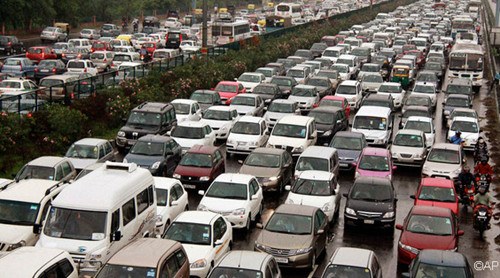India resumes power supply after 2-day blackout
 0 Comment(s)
0 Comment(s) Print
Print E-mail Xinhua, August 1, 2012
E-mail Xinhua, August 1, 2012
India's power supply was restored to its full capacity Wednesday, after two days of blackout which affected more than half of the country's 1.2 billion population in some 20 of the country's 29 states, including the national capital.
|
|
|
India's power outage led to a majority of traffic signals not working in most areas, causing massive traffic jams during office hours. |
A senior official of the Power Grid Corporation of India, the state-run company which operates all five of the regional grids or supply networks, said that 98 percent of the supply has been restored in eastern India and northern India, while 100 percent of the supply has been restored in northeastern India.
The northern, eastern and northeastern grids had collapsed Tuesday -- the northern grid for the second day in a row -- affecting nearly 600 million people across more than half of the country. The outages caused chaos on roads and brought rail services to a grinding halt.
Essential services, like water supply and power supply to hospitals, were also hit, particularly in the national capital, which bought electricity from Bhutan to meet the shortfall to some extent. The Indian government has blamed the states for the crisis.
However, experts are not convinced. They claim that it was due to utter mismanagement of the power supplies across the country and the failure to meet the growing demand of electricity.
"Power cuts are common in Indian cities due to a fundamental shortage of power and an aging grid. But the collapse of an entire grid is rare -- the last time the northern grid failed was a decade back. These power grids are administered by retired bureaucrats who just while away time instead of providing innovation to meet the growing demand for power supply," feels AK Choudhury, a Delhi-based expert.
In a media statement Tuesday evening, Indian Power Minister Sushil Kumar Shinde, who was appointed Home Minister this morning, blamed the states for the massive outages, taking more than their quota of power from the national grid.
"This is just an excuse. What was the central administration doing all these years? They can't control power usage by states even after 60 years of independence. The explanation is unacceptable. Instead of sacking the Power Minister, the ruling Congress party has elevated him by making him the new Home Minister," said Prof Ajay Singh, a political commentator.
Singh said that successive governments have also failed to put an end to power theft. "This is because of vote bank politics. By allowing people living in slums and illegal colonies to steal power, successive governments have got their votes to remain in power," he added.
India depends mainly on three sources of power -- thermal power, hydroelectricy and nuclear power.
According to the experts, shortage of coal led to the shortage of production of thermal power; deficient rainfall hampered production of hydel power; and only 3 percent of the country's power is generated by nuclear power plants.
"India has missed every capacity addition target it has set since 1951 while its demand for electricity has soared in recent years with the economy growing at a good pace. India's power infrastructure has been unable to meet the growing needs. Time has come for introspection. The Indian government needs to do something concrete now instead of just assurances, like increase production of coal and natural gas," summed up Prof SK Gupta, Delhi-based expert, citing Indian Planning Commission figures.
Gupta said that the government must take steps to start full production of nuclear power in atomic plants across the country, by putting an end to protests by locals against nuclear power plants. "All developed countries depend to some extent on atomic power. India claims to be a superpower. So, it needs to start the production of nuclear power to meet the growing needs," he added.
Indian media have also lambasted the government for the power outages for two consecutive days.
'The Times of India', the country's largest-selling English daily, said in an edit, titled "India, interrupted" that "lack of power holds back India's industrial take-off, and prevents it from making the kind of strides in reducing poverty that China or East Asia have. In addition, cataclysmic failures due to a weak distribution system throw ordinary life out of gear. Unless we can summon up the political will to make systemic changes, this is going to happen again".
Another leading newspaper, 'The Hindu', said in its editorial, titled 'Delhi is powerless', "We need to augment our peak-load generation -- the lack of which, at this time of reduced rainfall, contributed to the latest grid collapse."
The newspaper added: "State governments need to understand that they should either find the funds to invest in power generation, or make it worthwhile for the private sector to set up new plants that can feed into the grid in order to cope with rising demand. These are long-term issues that India ignores at its peril."
Well, "Superpower India, RIP" chimed 'The Economic Times' newspaper, clearly indicating the power crisis the country is facing and the government's repeated failure to address the basis issue.







Go to Forum >>0 Comment(s)